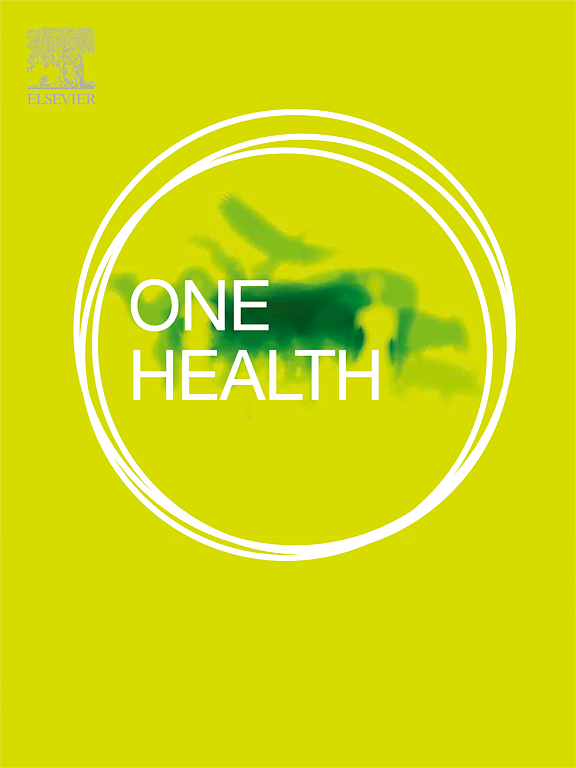揭示风险:厄瓜多尔农场动物和工人中Q热的血清流行率。
IF 4.1
2区 医学
Q1 INFECTIOUS DISEASES
引用次数: 0
摘要
Q热是由伯纳氏杆菌引起的一种人畜共患疾病,尽管对动物和公共卫生都构成重大风险,但在很大程度上被忽视了。尽管在一些国家有很好的研究,但在拉丁美洲的大多数国家,缺乏关于伯氏杆菌感染的信息,它的流行程度,以及它对牲畜和人类的影响。为了解决这一差距,我们在厄瓜多尔的两个奶牛场使用商业ELISA试剂盒对农场工人、牛、羊和狗进行了血清调查。此外,我们在牛中进行了一项病例对照研究,以调查伯氏梭菌感染与流产之间的关系。调查结果显示,18%的农场工人、30%的狗、25%的牛和2%的羊被检测出Q热抗体呈阳性。有趣的是,在牛中没有观察到伯氏梭菌感染和流产之间的显著关联(p犬新孢子虫血清阳性率表明这种寄生虫感染与流产有很强的联系。结果显示,在被调查的农场中,人类和动物都存在Q热,其中农场狗的血清患病率最高。值得关注的是,在农场工人中检测到大量的抗体,这表明可能有由伯纳蒂胞杆菌感染引起的未经证实的症状性呼吸道感染史。然而,需要进一步调查以更好地了解感染动态及其对公众和动物卫生的潜在影响。本文章由计算机程序翻译,如有差异,请以英文原文为准。
Shedding light on risk: Seroprevalence of Q fever among farm animals and workers in Ecuador
Q fever, caused by the bacterium Coxiella burnetii, is a zoonotic disease that has been largely overlooked despite presenting significant risks to both animal and public health. Although well studied in some countries, in most countries in Latin America, there's a lack of information on C. burnetii infection, its prevalence, and its impact on both livestock and human populations. To address this gap, we conducted a serosurvey among farm workers, cattle, sheep, and dogs on two dairy farms in Ecuador using a commercial ELISA kit. Additionally, we conducted a case-control study in cattle to investigate the association between C. burnetii infection and abortion. The findings revealed that 18 % of farm workers, 30 % of dogs, 25 % of cattle and 2 % of sheep tested positive for Q fever antibodies. Interestingly, no significant association between C. burnetii infection and abortion was observed in cattle (p < 0.05) but a high Neospora caninum seroprevalence indicated a strong link to abortion due to this parasite infection. The results highlight the presence of Q fever in both humans and animals on the surveyed farms, with farm dogs showing the highest seroprevalence. A point of concern arises from the significant prevalence of antibodies detected among farm workers, suggesting a potential history of unconfirmed symptomatic respiratory infections caused by a C. burnetii infection. However, further investigations are necessary to better understand the infection dynamics and its potential implications for public and animal health.
求助全文
通过发布文献求助,成功后即可免费获取论文全文。
去求助
来源期刊

One Health
Medicine-Infectious Diseases
CiteScore
8.10
自引率
4.00%
发文量
95
审稿时长
18 weeks
期刊介绍:
One Health - a Gold Open Access journal.
The mission of One Health is to provide a platform for rapid communication of high quality scientific knowledge on inter- and intra-species pathogen transmission, bringing together leading experts in virology, bacteriology, parasitology, mycology, vectors and vector-borne diseases, tropical health, veterinary sciences, pathology, immunology, food safety, mathematical modelling, epidemiology, public health research and emergency preparedness. As a Gold Open Access journal, a fee is payable on acceptance of the paper. Please see the Guide for Authors for more information.
Submissions to the following categories are welcome:
Virology,
Bacteriology,
Parasitology,
Mycology,
Vectors and vector-borne diseases,
Co-infections and co-morbidities,
Disease spatial surveillance,
Modelling,
Tropical Health,
Discovery,
Ecosystem Health,
Public Health.
 求助内容:
求助内容: 应助结果提醒方式:
应助结果提醒方式:


